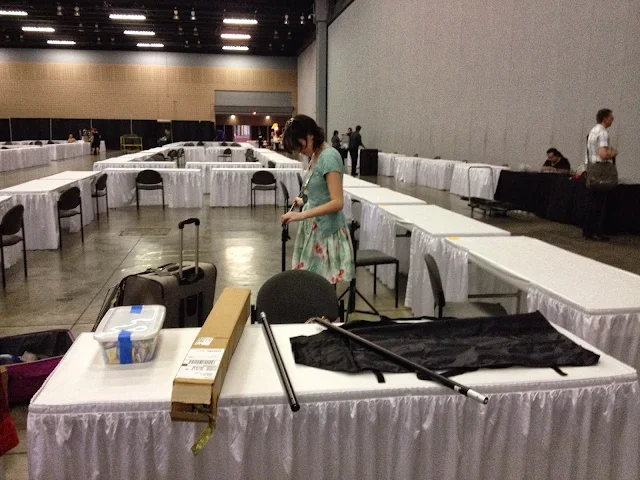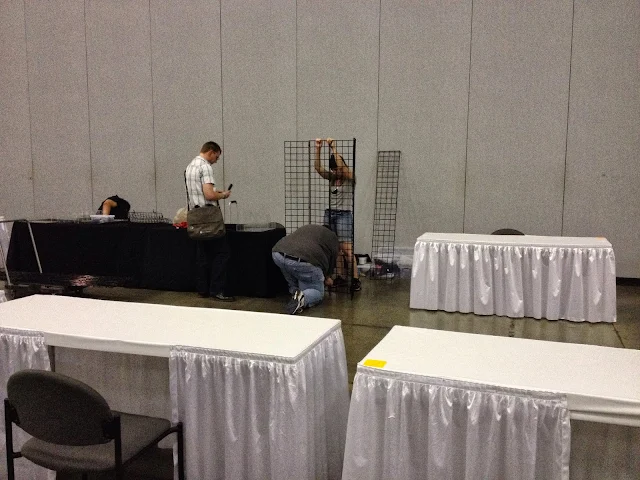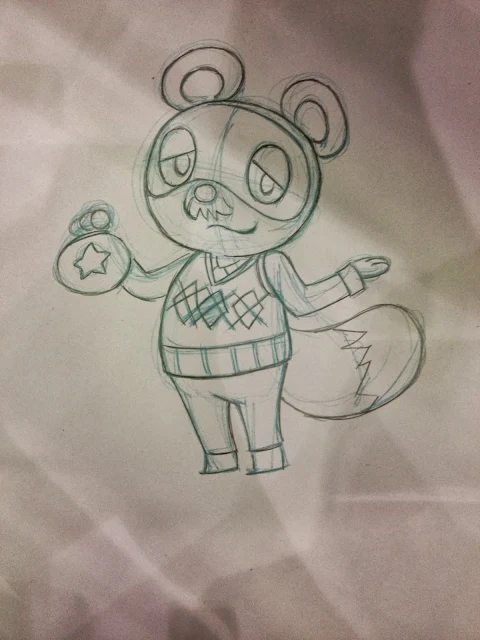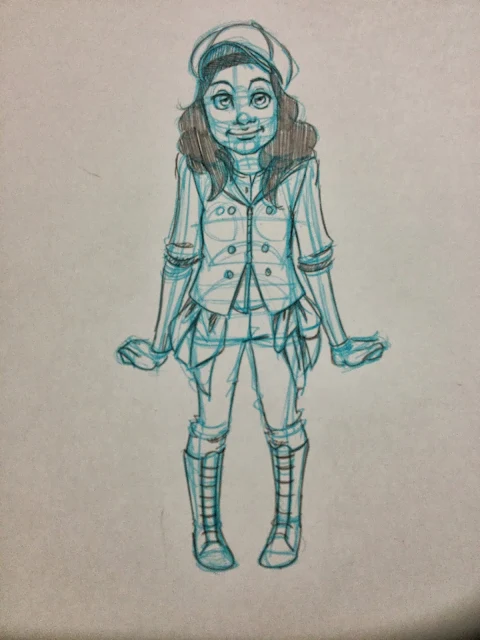Anime Weekend Atlanta 2013: Con Recap
Edit: Despite repeated attempts at correction, this post has some formatting errors. I am aware of them, have tried to correct them, and apologize for the inconvenience.
General Information About Anime Weekend Atlanta
Anime Weekend Atlanta is a fairly large anime convention held in Atlanta, Georgia, during the month of September. It is one of the largest anime conventions in the American south, and attracts attendees from all over the country. For many southern fans, Anime Weekend Atlanta is an opportunity to see friends, enjoy fandom, and possibly go up in rank as a cosplayer. For artists, Anime Weekend Atlanta may prove an affordable alternative to larger cons like Otakon. Anime Weekend Atlanta is located in the Cobb Galleria Center which includes free attached covered parking, a convention center, a hotel, and a mall with a covered walkway over the interstate.
Last year Heidi and I were invited to attended Anime Weekend
Atlanta as panelists and as regular guests. Because I
wasn't stuck behind a table with a mental sales quota, I was able
to peruse the Artist Alley at my leisure, and was really
impressed with what I saw. The Artist Alley seemed to be
well run and properly organized, with large alleys designed to
accommodate a lot of traffic. There was a diverse range of
skill among the attending artists, and it was clear that all had
put time and love into their art, rather than mass producing
fanart. The staff I talked to last year seemed
enthusiastic, intelligent, and eager to answer questions, which
is always a huge plus at anime conventions. I was so impressed
that when Anime Weekend Atlanta opened up their Artist Alley
registration for this year, I jumped right on it.
Anime Weekend Atlanta's Artist Alley is jury based, meaning that
applicants are selected based upon a submitted portfolio.
Last year I took the opportunity to pick the Artist Alley
coordinator's (Stephanie Reeves) brain for information, and was
informed that she and her staff try to select talented artists at
all skill levels, creating a diverse artist alley that can cater to
a wide array of customer tastes. When reviewing applications,
the artist alley's staff employ's the 50/50 rule- no more than 50%
of the submitting artist's submitted portfolio can be fanart.
This rule is intended to challenge artists to present their
original properties, rather than rehashing the work of others, and
is becoming common at larger anime conventions.
Preparing for Anime Weekend Atlanta
I submitted my curated
convention portfolio and kept my fingers crossed that I'd
hear good news. Heidi and myself were already slated to
present some panels at Anime Weekend Atlanta 2013, and I'd hoped
that the popularity of last year's panels, combined with this
year's panels, would put our applications over the top. I
knew that if I was accepted, September would be a hectic month,
but since I'm trying to establish a name for myself and cultivate
an audience, I felt it'd be worth the struggle.
Convention season runs twice a year for me- from Spring til early
Summer, and then Fall convention season beginning with Mechacon
and ends when I run out of cons. Anime Weekend Atlanta falls
within my Fall convention season, which are some of my busiest
months. Only two weeks after SPX,
I rushed to finish some new mini watercolors, get Chapter 3 of Kara
painted, and revamp my table setup. Last year's Anime Weekend
Atlanta's Artist Alley convinced me that these artists were a cut
above, and I wanted to compete on a level playing field. In
prior convention setups, I'd lacked a vertical element to catch
attention from across a crowded convention floor, and I made it a
priority to solve that problem this convention season.
New Display Materials
My solution came in the form of a new horizontal above table banner
(6'x2') printed by BuildASign. While the print
quality was mediocre, the price was hard to beat ($30, shipped to
me, with a SlickDeals coupon) and the turnaround was fantastic (I
received my banner in under a week). It needed some
modifications- additional grommets (purchased at JoAnn's for $11,
set by the amazing Joseph Coco) and a banner stand. Instead
of a conventional banner stand, I trawled Amazon to see what could
be cheaply repurposed, and settled on a photographer's backdrop
stand. As a stand, it could use additional improvements, but
the price made it hard to resist and I wanted something that could
easily hold other banners.
In Action at AWA
Unfortunately, this banner stand has a huge footprint, and isn't as
stable as the tripod legs would suggest. It's extendable, but
in awkward sizes, since I have to add 2' lengths of pipe to make it
larger. I ended up settling on the 5' length and adding an
extra 6" on each side with some wooden dowels I bought at Home
Depot the night before the con opened. On the plus side, this
stand breaks down rather compactly, and comes with it's own case,
which means I'd consider bringing it for conventions I needed to
fly to. While this is a great solution when I'm tabling alone
and have ample space, I still think I need a large vertical
banner, or at least a banner stand to hold the 3"x2" banner I used
at SPX. The jerry-rigged easel/attaching it to Heidi's banner
stand (as seen at SPX) wasn't really doing my work any favors.

|
| Image Source |
An element I reintroduced to my setup for Anime Weekend Atlanta
were the wire cubes I'd used at Mechacon. In the past, I've
referred to this as a "McDonald's Setup" (because all you can see
is the person's face behind their art), but I lovingly call it 'the
cage' now. While I'm not a huge fan of my wire cubes, they do
provide an easy scaffolding for displaying watercolors and
commission examples. Unfortunately, they also take up a lot
of space on the table itself. They're limited to conventions
I can drive to where I don't have to share a table, meaning I
really need to find a better solution. I've seen artists with
the plastic equivalent of the metal cubes, but in order to be as
structurally sound, the plastic panels are more plastic than free
space, further enforcing the feeling of being inside a cage.
I'm still trying to find ideal setups for both shared and single
person tables, so I don't necessarily recommend my methods over any
other methods in common practice. At all anime conventions
I've attended, I've seen wire cubes used to various affect, as well
as more creative approaches that require a bit of technical skill
to assemble.
My Anime Weekend Atlanta Gameplan
When preparing for conventions of any sort, I like to go into it
with a gameplan. Since Anime Weekend Atlanta is an anime
convention, I decided to apply everything I've learned from doing
other anime cons. My Fall convention season was shaping up to
be very different from not only my Spring convention season, but my
prior convention experiences. The introduction of mini
watercolors and displaying examples of $5 sketches meant my sales
nearly doubled, although the majority of my sales were in product
that was created at the convention itself. This has a natural
ceiling, as I can only create so many finished pieces in a set
amount of time, and many potential customers are uneasy about
paying ahead of time for a commission that will be mailed to them.
I tried to predict what would be popular at Anime Weekend
Atlanta based on what is generally popular on Tumblr and what sold
well at Mechacon. I restocked my Sailor Moon collection,
focusing on finishing the outer senshi (a first for me) and did a
few Studio Ghibli watercolor fanarts. I'd really hoped to
sell a lot of pre-painted mini watercolors, and I thought my
InkIt acrylic
charms would sell
well, and I planned on having 7" Kara Chapter 1 and 2 at the very
front of the table, for easy reading access.
A Sampling of My Mini Watercolors
The Convention Itself
I wasn't the only one concerned about improving sales. This
year Anime Weekend Atlanta took further steps to ensure that the
Artist Alley received traffic by having three food trucks on the
actual artist alley floor. Located toward the back of the
ballroom, the food trucks brought in a lot of foot traffic and
provided an easy (and somewhat nutritional) food option for artists
who didn't feel comfortable leaving their tables unattended.
I sampled food from both the taco truck and the chicken and
waffles truck, and found the quality to be pretty darn acceptable
by convention food standards. My only qualm is that both
foods are fairly messy- it would have been nice to have a fresh
fruit smooth truck, or even a truck that offered espresso.
However, other food options weren't very far away, as Anime
Weekend Atlanta is held in a hotel/conference/shopping complex.
While the food trucks DID bring traffic into the Artist Alley, many
attendees simply made a bee-line for the food trucks. Some
artists were worried that attendees carrying food around might
accidentally spill on the tables, a problem that could be averted
if less messy food options were available. While I didn't
have any problems with attendees spilling food on my table, sweaty
boba-tea cups did leave water rings on my table cloth, and some
artists may have had prints ruined due to this. Neither of
these issues are really the fault of Anime Weekend Atlanta, but
rather convention attendees not being aware of what they're
doing.
Photos!
Photos below were taken by the lovely Julie Black, and are used with her permission. Thank you, Julie!Never before caught on film! Explicit scenes of convention setup! Keep on Truckin' Nattosoup EXCLUSIVE
Totally unglamorous, but at least they let us set up on Thursday afternoon, before the convention opened, rather than Friday.
The Panels
Last year, Heidi and myself hosted three panels, this year it was
only two. One was the All Ages Drink and Draw (link), which
was held in the hotel's bar area at 9 on Friday evening. When
we proposed the panel, we had high hopes of making it an all
inclusive welcoming event that would give artists an opportunity to
meet new friends and possibly share their projects. We had
hoped to be given a conference room and the ability to provide
snacks and non-alcoholic drinks, but we had to adhere to the
hotel's policy, and held the event in the hotel's lobby/sub bar
area. Apparently we were supposed to be provided with a
bartender and an open lounge area for the event, but by the time we
arrived after dropping off our bags at the hotel, the lobby area
was jam packed with convention attendees. A staff member
attempted to help us clear some space by announcing that lounge
area was for the Drink-n-Draw several times, but the attendees
didn't really pay her much heed. We did manage to gather a fairly
sizable group, but we had a hard time getting things organized in
such a noisy setting, and attendees had a difficult time finding
chairs. Although we'd planned to have some ice-breaking
games, it was just too noisy and disorganized to attempt to corral
participants. Instead, we ended up breaking off into small
groups, drawing, and chatting. The All Ages Drink-n-Draw went
relatively well, but due to the noise level and lack of available
seating, it was not as organized as we would have liked. We
still saw an impressive turnout, and hope that we'll be given an
opportunity to make improvements on the event next year.
Our other panel was co-hosted with Angela Sasser, the creator of
Angelic
Shades. This panel focused on Business
Practices in Art. I had some misgivings prior to the panel,
since this can be a very open ended topic and we were hosting it as
a Q&A, but the audience seemed eager to talk and pick our
brains, so I feel like it went quite well. I would have liked
to have recorded this panel to post here, but since we were
co-hosting it, I wasn't sure if that would be appropriate.
Sales

|
| As you can see, a very busy table. I might need to reconsider how I allocate space in the future. |
Sales at Anime Weekend Atlanta were comparable to those at
Mechacon, I made about $480 the entire weekend, which is a little
less than Mechacon. I found this surprising at first, since
Anime Weekend Atlanta is a much larger convention. After some
thought, I think I know why.Mechacon was the first anime convention
I'd made a profit at, and I'm still figuring out what to sell and
how to present myself to attract customers at anime cons. I
based my strategy for Anime Weekend Atlanta off what I'd learned at
Mechacon, but there were several factors I had no control over.
Factors include:
- my table placement (less ideal than at Mechacon, but far better than at SPX), the quality of the Dealer's room (supposedly quite poor at Mechacon, which meant people spent more money in the Artist Alley).
- Anime Weekend Atlanta is a much larger convention, with a lot of con programming, so the Artist Alley has some stiff competition for the guests attention.
- Since Anime Weekend Atlanta is a larger convention than Mechacon, it of course follows that it has more artists, which means more competition for me.
- Anime Weekend Atlanta's Artist Alley hours are actually shorter than those of Mechacon, so while I wasn't burning the midnight oil at my Artist Alley table on Saturday night, I also missed those sales.
- Even though I'd restocked my store of cute acrylic charms, they weren't selling as well as they did at SPX, and buttons hardly sold at all. Those little sales of pre-made items really add up.
- I lost two working hours Saturday evening, which meant I couldn't take many at-con commissions on Sunday.
I focused my attention on pushing mini watercolors, charms, and
commissions, and most of my sales came after my assistant added a
"I Love to Draw Original Characters!" sign to my commissions
display (this is true, I love helping bring head characters to
life, and as a comic artist, I have plenty of O.C's myself).
Sales really increased after she added the sign Saturday
afternoon, to the point where I started to fall behind a bit.
I figured I'd have plenty of time after the con floor closed
to knock out commissions, but a 2 hour wait at a local restaurant
meant I didn't get in until around 10p.m., and although I worked
until 4 a.m., I was still behind Sunday morning. I closed
at-con commissions on Sunday, and sales definitely slacked off, but
I still sold a few take-home commissions. Had I been able to
finish my commissions on Saturday, I probably could have broken the
$500 mark with at-con sketch commissions.
At Con Commissions
All of these are terrible cellphone pictures taken in haste before the customer came to pick up their commissions, so I apologize for the photo quality.
The shadows make it look all crumpled, but I promise,
it's not. It's blue pencil and graphite drawn on cardstock,
in an archival bag.
I realize that I'm shooting myself in the foot with my low at-con
commission rates, and while these commissions were specifically
designed to be worth the price I'm charging and to be time
efficient, I'm always tempted to overbook myself. A big part
of this stems from the fact that anime conventions are a huge
opportunity for me to make money with art, I'm always willing to
really push myself to my limits. In general, I don't
sell many commissions online, and while I've offered
pre-order commission slots for conventions, I never seem to fill
those either. I realize that moving pre-made items would help me
break the ceiling set by my own physical drawing limitations, but
unfortunately sales of my comics, buttons, and charms aren't
particularly impressive compared to other artists (although I can't
provide an accurate amount, since I haven't had a chance to crunch
my sales data yet). The pre-painted mini watercolors generate
a lot of attention and help make selling commissions easier, but
they don't necessarily sell well either, particularly if I've
misjudged the popularity of a particular fandom at a particular
con.
Because I was so busy trying to fill commissions, I didn't really
have an opportunity to explore the convention or even the Artist
Alley itself. This is really regrettable, since I've learned
the most about participating in the Artist Alley by actively
wandering around and taking notes. This also meant I missed
out on seeing and meeting internet friends who were also at that
con. Hopefully if I can attend next year, I'll make time to
explore the Artist Alley, support my fellow artists, and say hi to
long distance friends.
Take Home Commissions:
And there are a few more, but I hadn't photographed them at the time of writing this.
In Conclusion
In many ways, this anime convention differed from any other I'd
attended. Heidi and I brought separate assistants- she
brought her sister Julie, I shared Alex Hoffman's assisting
abilities with my friend Emily Kluwin. Separate assistants
was a necessity- because we were leaving mid-Saturday to host a
panel, we each needed someone to make sales for us. Anime
Weekend Atlanta is the busiest convention I've ever hosted a panel
or event at, so I didn't want to risk the divided attentions of a
single assistant. This was also our first year co-hosting a
panel with someone we'd never met, and while I had some anxiety
pre-panel, things seemed to go smoothly. Every anime
convention I've attended has its ups and downs, so for those of you
who are trying to decide if AWA is right for you, here's my pros
and cons.
Pros:
- One of the largest anime conventions in the South, still manages to retain southern hospitality
- Much easier to navigate than massive conventions like Otakon, and better organized. I didn't have to wait four hours to pick up my pre-registration badge.
- Artists in the Artist Alley are allowed to set up on Thursday, rather than trying to set up Friday morning.
- Artist Alley staff sincerely care about the tabling artists, and try to improve the experience every year.
- The Artist Alley isn't just a by-thought at Anime Weekend Atlanta, unlike many anime conventions I've attended.
- Artist Alley is located in a ballroom next to the dealer's room, and is locked at night.
- Food is conveniently located.
- Staff is friendly and enthusiastic.
- A variety of artists table at Anime Weekend Atlanta, so it's an excellent opportunity to make new friends.
- A single table at Anime Weekend Atlanta is $100, and comes with two badges, making it quite affordable for a large con.
Cons:
- Anime Weekend Atlanta is considered by many to be a 'cosplayer con', meaning it attracts a lot of cosplayers. Unfortunately for artists, cosplayers often don't carry their wallets in their costumes, and many may be broke from having just completed an expensive costume.
- As usual for anime conventions, I found that my original comic didn't sell at all.
- Despite the 50/50 rule for submissions, a lot of artists offered little else but fanart prints. This can be used to your advantage if you offer something unusual.
- Because the Artist Alley is juried, you may have difficulty getting in.
- Some artists claimed they applied, were accepted, and never heard back from the staff. I cannot verify this claim, but I do know that there were a lot of cancellations this year, and artists were given the opportunity to change tables if they wanted.
All in all, I enjoyed tabling at Anime Weekend Atlanta, and hope I
have further opportunity to do so. I'd like to add it to my
yearly rotation of conventions, right behind Mechacon as my
favorite anime con to table at.























































Comments
Post a Comment